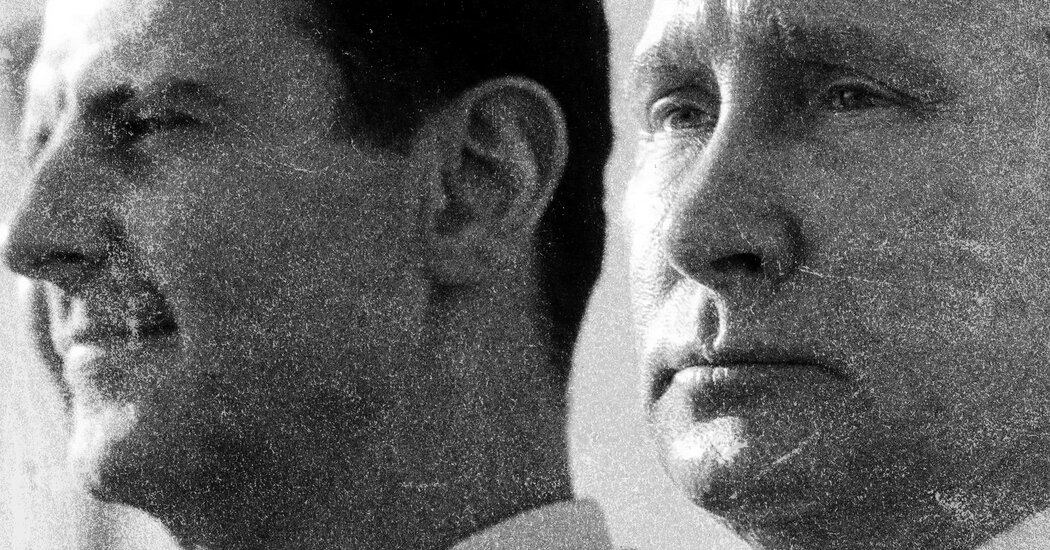
Putin just suffered a huge defeat
Syrians Love the U.S. Military: Why Do They Want to Return? President Biden says Syria is Not a Problem for the United States
Turkish leader would like to see 3 million Syrians return to their homeland. Some have already begun doing so. Turkish construction companies are well positioned to rebuild Syria, ravaged by more than a decade of war.
“Turkey can become the kingmaker,” he was quoted as saying. Turkey will be in a position to benefit from a friendly government in Damascus.
Some changes have already been seen. Syrians who have fled the country in the past years are lined up at the border crossing to return. The gates are swinging open at the country’s notorious prisons, freeing thousands. Syrians are speaking freely after decades of repressive rule.
U.S. forces have been battling the Islamic State in Syria for a decade and largedly defeated the group five years ago. About 900 U.S. troops remain to prevent a resurgence of the extremist organization. Most of the Americans are in remote northeastern Syria, with others in the far south.
President Biden stated Sunday that the U.S. would maintain its military presence. He called Assad’s ouster both a moment of risk and opportunity, adding that the U.S. would work with Syrians as they try to put together a new government.
However, President-elect Trump is striking a different tone. he took to social media over the weekend saying that Syria is not a problem and the U.S. should not get involved.
Some displaced people are getting humanitarian assistance from US forces on the Syria’s southern border, according to an American aid group.
“If you spoke to any of these people and you asked them about the United States military, and you asked them about the relationship between the two, those Syrians love the American military,” Moustafa said.
Assad’s Downfall, the War between the Middle East and Russia, and a Battle of the Assad-Assad “Axis of Resistance“
Assad’s downfall is the latest in a series of major setbacks for Tehran. Persian Iran has spent the past four decades developing Arab partners and proxies in the region, collectively known as the “axis of resistance.” But in the past year, they’ve been tumbling like dominos.
Russia and Syria had a close relationship in the region for decades. When the Syrian rebels were threatening Assad’s government in 2015, the Russian air force heavily bombed rebel areas and helped secure Assad’s hold on power.
Hezbollah has been weakened by its war with Israel, and another Iranian proxy, Hamas in Gaza, was devastated by its own war with Israel.
Iran will be dealt a huge blow if Syria is lost. The leaders in Iran must be feeling anxious right now, according to a Middle East Institute researcher. “This is a moment where Iran’s regional strategy has been dealt a huge blow, and at a time when the regime at home is being questioned by millions of Iranians.”
When Syrian rebels swept through the country in less than a week, Russia mostly watched from the sidelines. The crowd of ecstatic Syrians celebrated Mr. al-Assad’s departure. The loss of Mr. al- Assad’s government amounts to a devastating loss in Russia. Decades of Russian military and political investment to carve out a foothold in the Mediterranean are now at risk. Vladimir Putin may yet manage to retain some stakes in a post-Assad Syria, but there’s no way around it: He just suffered a significant defeat.
Russia places great value on its naval base and air base in Syria. They are Russia’s only military bases in the Middle East, and they are at risk now. The previous bombing campaigns of Russia inflicted heavy punishment on the rebels, which might make them hesitant to keep that military presence.
The End of the Dark Ages: A View from the Back of an Interior Minister: Israel’s Damascus Defeats Assad
Israel considered Assad the devil, despite always being at odds with him. Assad kept the frontier with Israel relatively quiet even as the wider region was a point of contention.
It is difficult to predict how things will go in the coming weeks, months and years because it is a complex situation on the ground. There are five dynamics that experts say will be important to pay attention to as the new chapter of Syria begins.
Israel captured the Golan Heights from Syria in the 1967 Mideast war and later annexed the strategic territory. Regardless of who succeeds in Damascus, Israel’s hold on the Golan Heights will remain a point of vexation.
Governments are familiar with the dangers of an autocrat’s fall. Civil war dominated Libya for years after the death of Muammar Gaddafi in 2011, just as it did in Iraq after Hussein was toppled. They’re watching events in Syria with a cautious eye.
The ousting of Assad who ruled Syria for 25 years after his father died leaves a dangerous political vacuum. Ahmed al-Shara – formerly known by his nom de guerre, Abu Mohmmad al-Jolani – at the head of Hayat Tahrir al-Sham, or HTS, is at least nominally in charge. He leads a fractious rebel alliance which battled Assad over more than 13 years. Formerly known as the al-Nusra Front, HTS was once affiliated with al-Qaida. Although Shara claims to have broken ties with al-Qaida, HTS remains on a U.S. State Department list of terrorist organizations.
The Prime Minister stood his ground despite Assad leaving Syria before the rebels seized power in Damascus. “We are working so that the transitional period is quick and smooth,” Jalali told Sky News Arabia TV on Monday, according to The Associated Press.
Joshua Landis, a Syria specialist at the University of Oklahoma said that having Assad’s prime minister stay on was clearly an arrangement with the rebels. “They have worked it out, what looks to be a brief, peaceful handover of power.”
Sanam Vakil is the director of the Middle East and North Africa Programme at Chatham House, which is located in London. She thinks we can give everyone a bit of time to figure it out.
Vakil says that if there is eventually parliamentary democracy and more inclusive parliamentary democracy, it could be a positive for Jordan. If a Taliban like scenario happens, that’s not very positive for a country like Jordan that has its own Muslim Brotherhood.
The diversity of ethnic and religious stakeholders in Syria paints a complicated picture: Assad’s powerbase was drawn from Shia Muslims, and the small but influential Alawite religious minority that he belongs to, combined with other groups make up about 13% of the population. Sunni Muslims, by contrast, account for roughly three-quarters of Syria.
The Alawite minority, concentrated mainly on the Mediterranean coast, has now suddenly found itself out of power and potentially more vulnerable. There is considerable tension between the two main Muslim groups in Syria. But so far, there are no signs of reprisals by the new leaders, he says. Everyone is wondering if there will be revenge killings or real unrest in the Alawite territories.
Vakil says there’s concern that Syria could descend into a strict fundamentalist Islamic state similar to Taliban-led Afghanistan, although the country’s new leaders have made pronouncements that seek to dispel that fear.
Defending the Post-Assad Regime in Syria with the U.N. Special Envoy for Syria Geir Pedersen
The rebels, for instance, issued a statement on social media Monday instructing their fighters that it is “strictly forbidden to interfere with women’s dress or impose any request related to their clothing or appearance, including requests for modesty.”
But U.N. Special Envoy for Syria Geir Pedersen, speaking in Qatar, on Sunday, sounded a word of caution, saying he was hearing “contradictory messages” coming from the new leadership. “This is now my key message to all – avoid bloodshed, make sure that it is inclusive, that all communities in Syria are included, and that the nervousness that some are facing, are fearing, that we can address this, and move forward to peace and stability,” he said.
“Syria is at a crossroads – between peace and war, stability and lawlessness, reconstruction or further ruin,” the UN High Commissioner for Refugees Filippo Grandi said in a statement on Monday The agency said that “recent developments bring hope that the suffering of the Syrian people may finally end, and that the world’s largest forced displacement crisis can move towards just solutions.”
“Many of them are going to want to go home,” says Landis, adding that he thinks that given the history of their predicament, he thinks that “most will take a wait and see” position.
Daniel Mouton, a Middle East expert at the Atlantic Council, writes that “Millions of Syrian refugees will want to return home and are more likely to do so in an environment of good governance and active reconstruction.”
Even so, President Biden, in a televised address on Sunday, expressed concern about the post-Assad government in Syria: “Make no mistake, some of the rebel groups who took down Assad have their own grim record of terrorism and human rights abuses,” Biden said. In recent days, we’ve taken notice of statements made by the leaders of these rebel groups and they are now saying the right things. We will assess their words and actions as they take on more responsibility.
About 900 U.S. troops are stationed in Syria, mostly in oil-rich areas controlled by Kurdish militia forces. Syria’s economy is highly dependent on oil revenues and the presence of U.S. troops has denied the Assad regime access to those fields.
“Over the next six months, the United States is going to be in re-evaluation mode,” Landis says. If it wants good relations with the new state, it won’t punish them forever by withholding the oil.
Russia — a staunch ally of Assad and the destination for his immediate exile after fleeing Syria over the weekend — appears to have little recourse but to accept the new reality in the country.
Source: 5 things to watch as Syria confronts a new future
The U.S. Embassy in Bosnia and Herzegovina on Saturday: Putin, Vakil, and al-Assad for a peaceful resolution of the Syrian conflict
Amos Hochstein, the U.S. envoy to Bosnia and Herzegovina, said on Saturday that Iran’s pullout from Syria would make it harder to transfer weapons into that country.
I wouldn’t say that Russia was bad. And I will also say the same thing about Iran,” Vakil says. Both countries will probably not be looking to immediately, but rather to reestablish ties that are different for different purposes.
Russia provided military support and political backing. Throughout the several rounds of peace conferences that attempted to negotiate a peaceful settlement to the conflict, Mr. Putin and Mr. al-Assad remained as thick as thieves. In 2013, Mr. Putin had emerged as Mr. al-Assad’s knight in shining armor — and incidentally exposed the weakness of President Barack Obama’s “red line” in Syria — by vouching for the destruction of Mr. al-Assad’s chemical weapons within a year and heading off the prospect of American airstrikes. More than 80 Syrian civilians would be killed in a sarin attack a few years later, which the US blamed on the regime.

